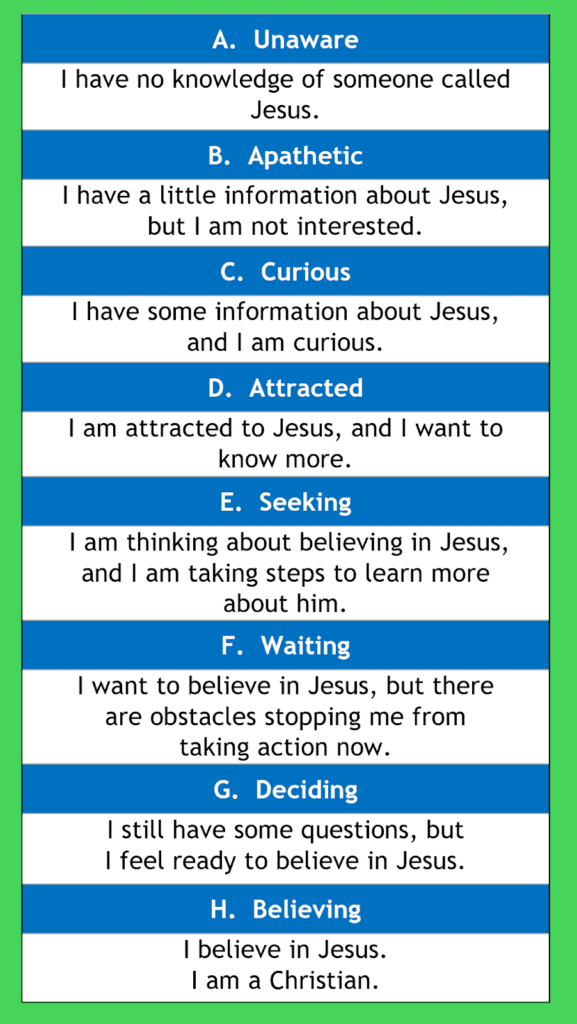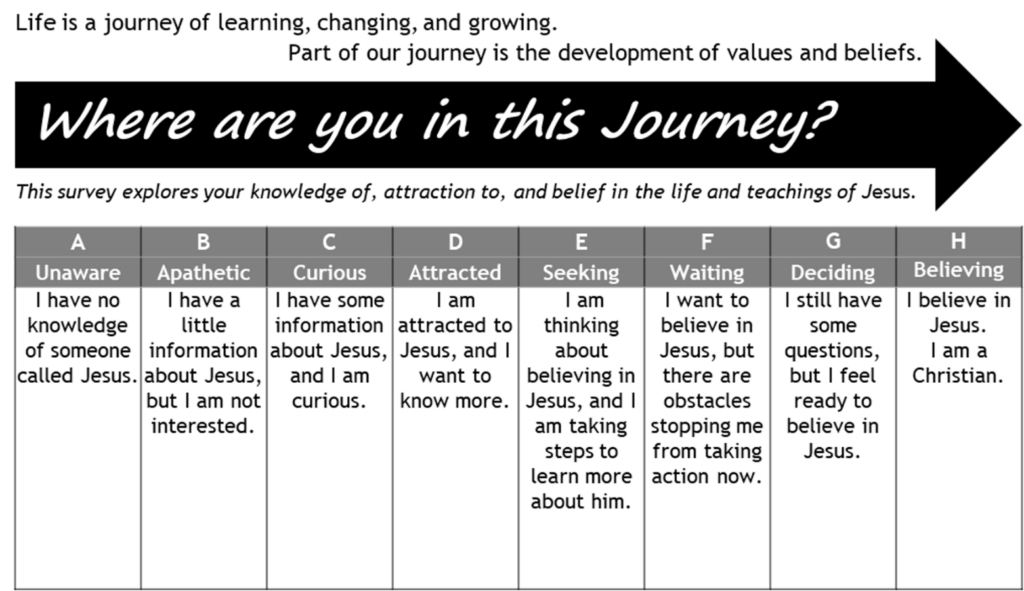Light Stories (Part 3) by James Loftin

For Those who Believed in Christ as a Child, The Straight Highway
This is the final article in a series on offering help for writing an effective light story. Check out the first one here, and the second one here.
If you miss the opening scene of a book or movie, you often will not understand or appreciate the rest of the story. Beginnings are important. That is why I believe it is so important for us to create and use light stories (testimonies) that clearly introduce how and why we BEGAN to follow Jesus. In a prior article in this series, I noted that most conversion experiences fall into three categories:
- Unconscious, “The Straight Highway” – when an individual is raised in a caring Christian environment and cannot remember a clear turning point or conversion moment
- Sudden, “The Downward Cycle” – when one has a quick and radical turning to Christ with little or no history of exposure to the faith or positive responses to Jesus’ invitation
- Gradual, “The Hilly Road” – when one has had a number of opportunities to follow Christ throughout their life and makes a series of incomplete responses until finally they yield with total commitment.
I think of these categories as three journeys to saving faith in Jesus. Regardless of what path you took to begin following Jesus, your light story (testimony) can be used by God to change lives. The guidelines for writing a light story I provided in the first article in this series are most helpful for people who had sudden or gradual conversion experiences. But those who were blessed to grow up in loving Christian homes have a different kind of challenge. How do you describe the wonderful reality of Jesus changing your life when you don’t remember how it all began
Have you ever heard or said something like this: “I don’t have a very exciting testimony. I grew up in a Christian home. I can’t remember a time when I did not believe in Jesus.” Take a moment now to reject that attitude. Every path to Jesus, every conversion, every light story is exciting. From death to life, from darkness to light, from loneliness to adoption into the everlasting family of God. What could be more exciting? However, the blessing of believing in Jesus early in life requires us to think carefully about how we tell our faith story, especially the opening scene.
The task of creating a brief and clear introduction to how and why you first believed in Jesus is particularly challenging for those who travel The Straight Highway. Your entire life was immersed in faith, the Bible, Jesus, Christian community and worship. There is no clear and sudden hundred- and eighty-degree turn in your life. When you entered the family of God, the angels rejoiced (Luke 15:10), but there were no headlines or social media posts announcing, “A Wild Sinner is Saved.”
In my work with Christians around the world, I have seen hundreds of creative and effective testimonies. These friends put in the work, and they involved friends and family in fine tuning their language. I have included some characteristics of those stories here. At the end of the document, I have inserted some excerpts from actual testimonies. I pray that this information will help you craft your own light story.
- The biggest temptation is length and language. The tendency is to write your spiritual biography instead of a brief testimony (see #2). Even if the testimony is relatively short, it is challenging for Straight Highway converts to stop themselves from using insider language: Sunday School, our small group, my youth group, our Bible study, “John 3:16,” sin, and the Holy Spirit (of just “the Spirit”). The reason we use the linguistic shortcuts is because most of our conversations are with like-minded people, people who already know people. That language is fine with your Sunday morning small group, but when you take a coffee break with your colleague Mohamed on Thursday, you must adjust your language. Clarity is the key to an effective witness with unchurched or pre-Christian friends.
- Too many details will distract listeners from the central truth: You said yes to Jesus and He has wonderfully changed your life. By omitting proper nouns (names of schools, churches, people, cities, camps, songs, books of the Bible, etc.), you are not creating a false account. It is incomplete on purpose: to help the listener focus on you and Jesus.
- The witness is not designed to answer every question about the Bible, Jesus and faith. Light Stories communicate our love for the listener, our gratitude to God, and our passion about following Jesus. When the witness achieves that goal, the listener will almost always be curious about hearing more. Don’t confuse this Light Story with a gospel presentation in which key doctrines and corresponding Bible verses are used. In future discussions, as God opens that door, you can share much more about the wonderful ways you have experienced Jesus.
- It is beautiful to acknowledge your family as a key way you were introduced to God’s love. That is a great blessing that your listener may not have experienced. But only use 2-4 sentences to describe your family and faith background. Focus on your family’s love for Jesus. Their love and attendance at church is neither clear nor compelling.
- Consider a structure like this: “Unlike many people around the world, I grew up in a family that loved Jesus, and they loved me. In this environment, it was easy and natural for me to say yes to Jesus at an early age. You may wonder how a child could choose to believe in and follow Jesus. Certainly, a child can’t understand all the aspects of God and the faith. You are correct. A child cannot understand God —- But who can? When I said yes to Jesus as a child, I gave all I understood about myself to all I understood about God. But that was not the only time I said yes. Over the years, I have updated my faith and commitment numerous times. After years of study, I still have questions that are not fully answered in my mind. My faith today is similar to my faith __ years ago. Today, I give all I understand about myself to all I understand about God.”
- Jesus once encouraged a group of adults to come to him like a child – simple faith (Matthew 18:2-4). What does that mean to you? Trust, humility, love, allegiance or what? How does that attitude relate to the yes you say to Jesus every day as an adult?
- Statements like “I have always been a Christian” are not helpful and are inaccurate. Since all of us are born in sin, every Christian has some type of conversion. A better way to communicate might be something like: “I can’t remember a time when I didn’t believe in and love Jesus.”
- Consider an opening like this: I have been following Jesus for a long time. It was not a fast decision. It was a process. Have you ever been outside before dawn when the night was almost black? Did you pause long enough to watch the glow in the eastern sky grow until the light was warm and bright. That is a bit like how I came to believe and follow Jesus. I do not know exactly when the sun rose, but I know this. The sun is shining on me now. Once I was walking in darkness, and now I’m walking in the light.
- Is an agricultural illustration helpful for your message? When I was very young, my parents planted this seed in my life: God is real. He loves you. You can know and trust him. I love my parents so I naturally received that seed. Over the years, family and friends watered the seed. Slowly but surely that seed grew into a plant. That plant – my life – continues to stretch toward the sun, the Son. I’m not sure when it happened, but I know it happened. I accepted the truth of Jesus, and I have committed my life to grow toward his love and guidance.
- Consider telling one story that illustrates what Christ means to you as an adult. When you started believing as a child and that meant things to you then. How does belief in Jesus impact your life now, today?
- Some people who came to Jesus via The Straight Highway mention things that their early decision to believe saved them from: shame, consequences of sin that could last a lifetime, stress on their parents and siblings, and missed opportunities.
- Although you heard about Jesus and were active in church as a child, was there ever a time that you wandered away – or thought about wandering (in your passion or your actions)? Choose a time that might relate to most listeners: pain, loss, disappointment, fear, failure, lack of meaning, etc. I have heard testimonies that include some pivotal moment in life: the death of a loved one, the loss of a job, a major illness or injury, a moral failure, a period when they were preoccupied with materialism or some other challenge. How did you encounter Jesus at that point? How did you choose Jesus again? How did that decision relate to your decision to say yes to Jesus as a child?
Testimony Language used by Other People who Grew Up in Christian Families
As you consider how to write your light story, it might be helpful to see the language used by other people with similar journeys to Jesus. The following are excerpts from light stories of people I have known.
Laralee: “When I was a child, my parents took us to church every Sunday. We learned about God, we learned about the Bible, we learned about Jesus. I learned about Jesus, but I didn’t really know Jesus. I learned the facts, but I didn’t really feel Jesus’ love for me.
“When I became an adult, I began to want all of the things that I thought were important in life. I still remembered Jesus, but I wanted more. I wanted a good job so I would make lots of money and buy nice things. I wanted to be respected by my family and friends. I thought this was what life was all about. So, I spent my life getting all of these things. But something was missing.
“When I was 33 years old, I went to a new church. I met people there who weren’t living for the things I was living for. They were living for Jesus. Not only did they know about Jesus, but they felt Jesus’ love and loved Him back. And they shared that love with me. They wanted nothing more in life than to live for Jesus and to love Him with all that they had. I could see that their lives were different than mine: better, happier, more fulfilling. I wanted what they had.
“Eventually, I dedicated my life to Jesus. And for the first time in my life, I felt the love of Jesus, and I knew that I had been forgiven for the bad things I had thought and done. I knew that Jesus loved me, and I started living every day to please him. I know this was what I was made for. I was made to be a follower of Jesus. And there’s nothing in the world I’d rather be.”
Madeline: “Growing up, my parents taught me about God and His Son, Jesus. I said that I believed in God and that I wanted to do what was right. But as I got older, I saw that I was really living for myself, for popularity and success, and not for Him.
“My first semester of college was difficult. Away from friends and family I felt lonely, classes were challenging, and my grandfather and a childhood friend of mine died within two months of each other. I didn’t know where to turn. I remembered the God I had known as a child. I silently cried out to Him, and asked for help.
“Shortly after that, a friend invited me to come with her to a small meeting of girls who studied the Bible together each week. I had known about God since childhood, but I never really understood that He loved me and wanted to have a relationship with me. I learned that God wanted me to rely on Him through the challenges I was facing. After many deep and honest discussions with the girls, I decided that I wanted to say yes to Jesus – again. I closed my eyes and just talked to God. I told Him that I wanted to live my life for His purposes, not my own. I had learned a great lesson. Without Jesus, my life was empty and without meaning, even self-destructive.
“After first hearing about Jesus as a child, I have experienced many challenges in life. But I am so thankful for Jesus. He is a friend that I can trust, and He is always with me.”
Bill: “I first decided to follow Jesus when I was 12 years old, but I did not really understand what that would mean until many years later. I have prayed for God’s help most of my life, but only in recent years have I really begun to understand how good God is. He is the source of all that is good for me, my family and friends. The Bible is the source of wisdom and guidance that helps me know how to live day to day. It also helps me keep growing in my understanding of Jesus’ life for me and all those who follow Him. How can I not follow the One who loves me so much that he would give His life for me?”
Joe: “From the very beginning of my life, my parents loved me and taught me that there is one true God. He created the universe, and he is love. Throughout my childhood, I learned more about God and what it means to follow the Son of God, Jesus.
“As I got older, however, I began to rely more on myself. I never rejected God; I just forgot about him. I thought that I could control my life. But then my life took turns that were complicated, painful, and scary. I began to realize that I wasn’t doing very well at controlling my life. Although I had learned about trusting God all my life, I was not placing my trust in God as an adult.
“It was my wife’s idea for us to start reading the Bible together each morning. These times of reading, discussion and prayer were like cool waters on parched earth. The more I listened for God’s guidance, the more peace and confidence I developed. It was like I had run into an old friend, someone who saved my life a long time ago, but I forgot to stay in touch with him. Despite my faults and failures, I realized again that God accepts me, loves me and has forgiven me. He is with me always, and that gives me confidence and clarity about the future.
“My life is far from perfect, but I am so glad that God walks with me every day. I know I will continue to face struggles, but God is with me. And that makes all the difference.”
A Final Invitation
This desire to communicate Jesus is one fruit of the Spirit’s presence in our lives. But we tend to use insider language when we talk about our faith. These testimonies encourage like-minded church members, but the impact on outsiders is diminished. As much as our church friends may need encouragement, I suggest that the greatest and highest purpose of your testimony is to bring light to darkness, proclaiming the Good News of Jesus to those who have not yet begun to believe and follow Him. That kind of testimony takes hard work and preparation. I pray that this series of articles have inspired and equipped you to create a light story that will be effective with friends who are not from your background and know little about your faith.
In Matthew 5, Jesus says, “You are the light of the world.” Receive those words and begin to build a taller lampstand for God’s glory and for the good of the world.
Subscribe
Get articles about mission, evangelism, leadership, discipleship and prayer delivered directly to your inbox – for free














